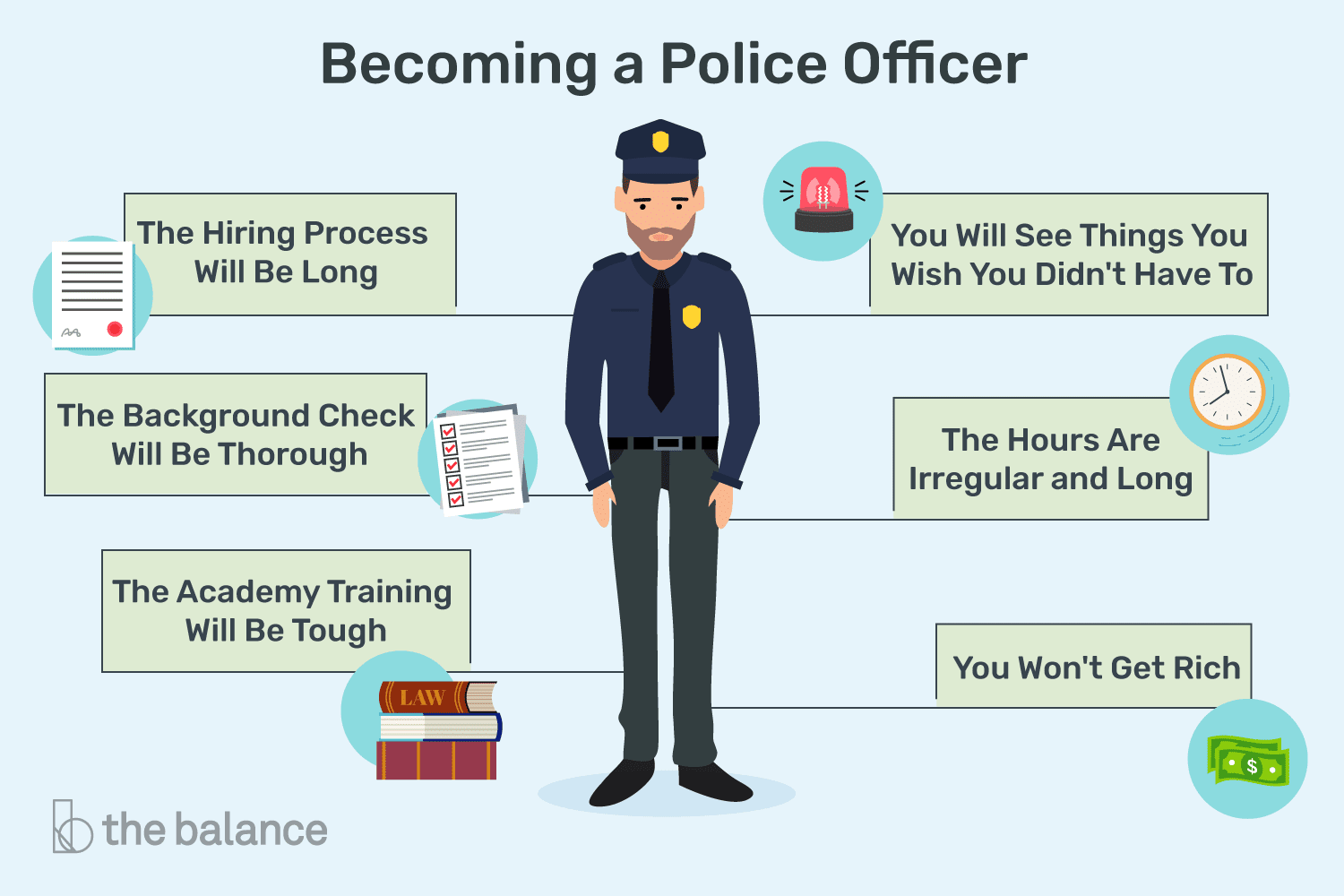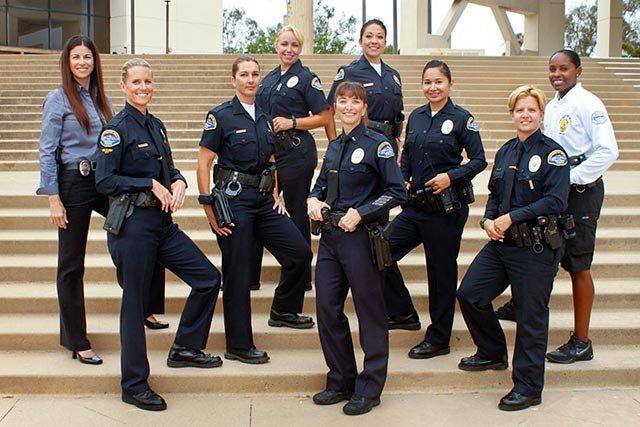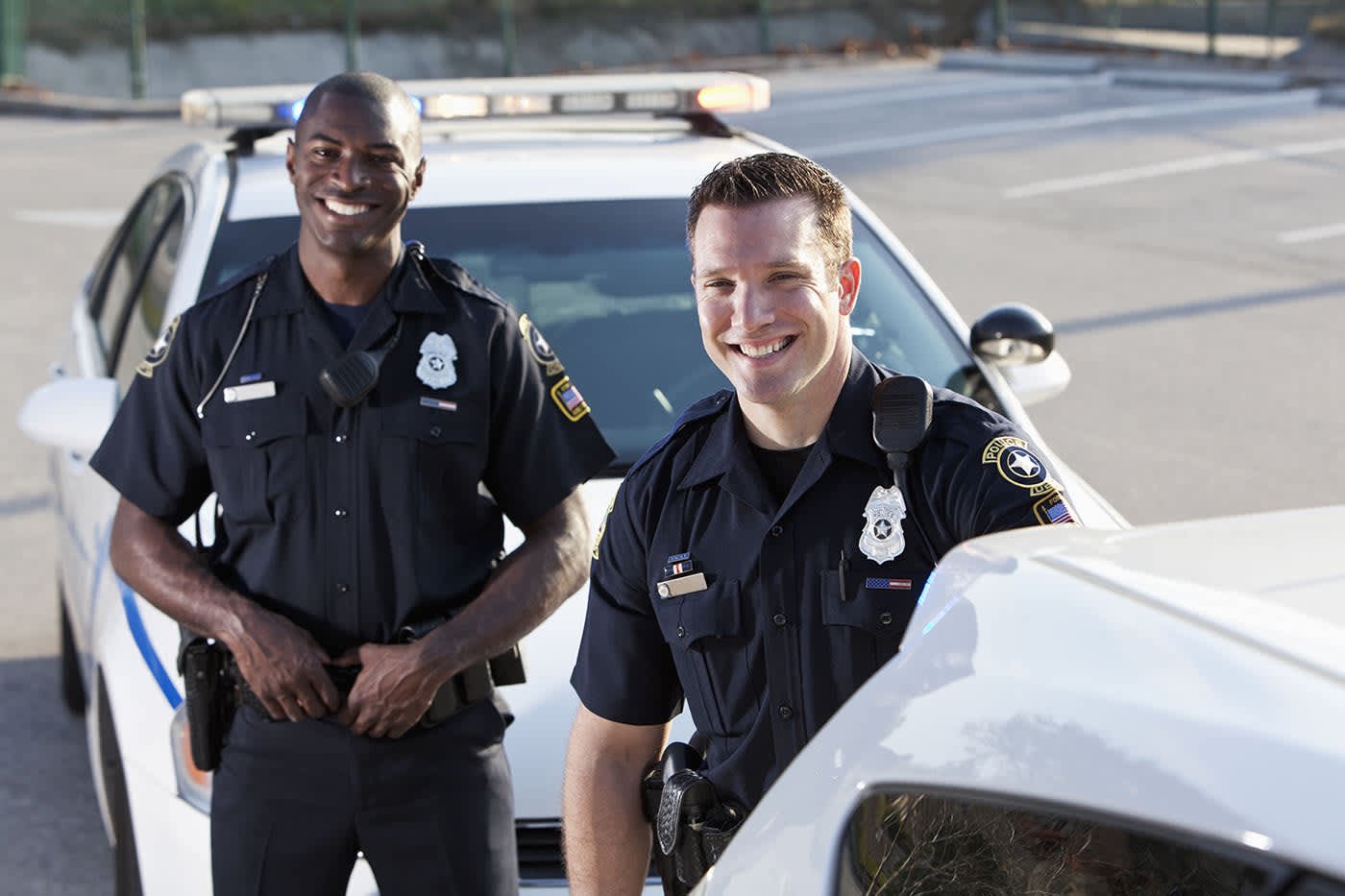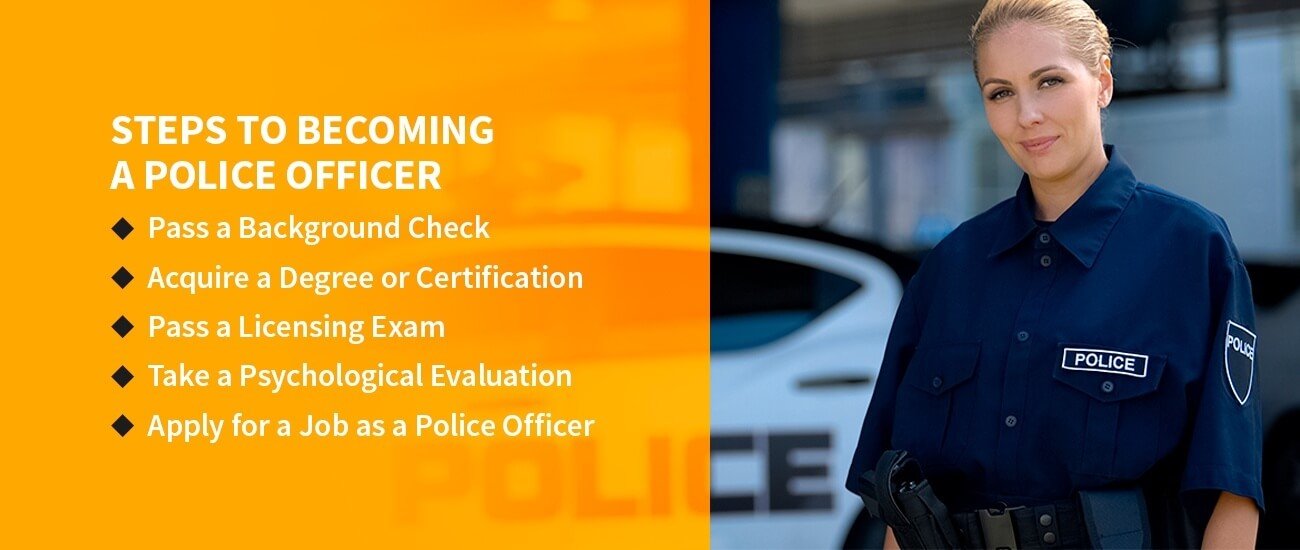If you’ve ever dreamed of serving and protecting your community as a police officer in the USA, this article is here to guide you through the necessary steps to turn that dream into a reality. From the educational requirements to the physical fitness standards, we’ll explore the path that aspiring police officers must embark on to enter this noble and important profession. So, if you’re ready to learn how to become a cop and make a difference, let’s dive right in!

This image is property of www.liveabout.com.
Steps to Become a Police Officer in the USA
If you have dreamed about becoming a police officer in the USA, you may be wondering where to start. Well, look no further! In this article, we will guide you through the comprehensive steps you need to take in order to pursue a career in law enforcement. From researching the requirements to applying for police officer positions, we’ve got you covered. So, let’s dive in and explore the exciting journey of becoming a police officer in the USA!
Research the Requirements
Before embarking on your journey to become a police officer, it is crucial to thoroughly research the requirements. Understanding what is expected of you will help you plan and prepare accordingly. So, let’s delve into the key aspects you need to consider.
Understand the Minimum Age Requirement
One of the first things you need to know is the minimum age requirement to become a police officer in the USA. While the specific age may vary from state to state and agency to agency, the general minimum age is typically 21 years old. However, there are some exceptions where individuals as young as 18 can apply, provided they meet certain criteria. Make sure to check the requirements specific to your area.
Check the Citizenship or Legal Resident Status Requirement
In order to become a police officer in the USA, you must either be a U.S. citizen or have legal resident status. This requirement ensures that law enforcement officers are committed to upholding and protecting the laws of the country. Be sure to have your citizenship or legal resident status in order before pursuing a career in this field.
Review the Education and Work Experience Requirements
Educational requirements for police officers vary across agencies. While a high school diploma or GED is the minimum requirement, some agencies may prefer candidates with higher education or specific degrees in criminal justice or related fields. It is essential to review the specific education requirements of the agency you want to join. Additionally, prior work experience in areas such as security or military service can also be beneficial.
Ensure You Meet the Physical and Medical Requirements
Being physically fit is a fundamental aspect of being a police officer. Most police departments have certain physical and medical requirements that applicants must meet. These requirements often involve passing physical fitness tests, medical exams, and meeting specific vision and hearing standards. It is vital to maintain a good level of physical fitness and address any medical issues that may hinder your ability to perform the duties of a police officer.
Learn about the Background Check Policies
Background checks are a routine part of the police officer hiring process. They are conducted to ensure that candidates have good character and do not have any disqualifying factors. This typically involves a comprehensive review of your criminal history, employment history, financial records, and a check of your references. Understanding the background check policies and ensuring your records are clean is essential to becoming a police officer.
Investigate the Required Training and Certification
Police officers undergo rigorous training to prepare them for the demands of the job. The specific training requirements and certification process can vary from state to state and agency to agency. It is crucial to investigate and understand the training programs and certifications required in your area. This will help you prepare for the journey ahead and ensure you meet all the necessary training requirements.

This image is property of images04.military.com.
Obtain a High School Diploma or GED
One of the basic educational requirements to become a police officer in the USA is a high school diploma or General Education Development (GED) certificate. Obtaining a high school diploma demonstrates that you have the necessary foundation of knowledge and skills required for the job. If you have not completed high school, you can earn a GED certificate by passing the GED exam. Either way, obtaining a high school diploma or GED is the first step towards your law enforcement career.
Complete a Higher Education Program (optional)
While a high school diploma or GED is the minimum requirement, completing a higher education program can give you an added advantage in the competitive field of law enforcement. Consider pursuing a college degree in criminal justice or a related field. This can provide you with a deeper understanding of the criminal justice system, enhance your critical thinking skills, and broaden your career opportunities within law enforcement. Engaging in law enforcement studies or programs can also be beneficial, as they focus specifically on the skills and knowledge required for a successful career in this field. Additionally, acquiring knowledge in sociology, psychology, or criminology can further enhance your understanding of human behavior and the social factors that contribute to crime.

This image is property of media.cdn.lexipol.com.
Maintain Physical Fitness
Physical fitness is a crucial requirement for police officers. A law enforcement career demands physical strength, stamina, and agility. Therefore, maintaining physical fitness should be a part of your daily routine. Here are some tips to help you stay in top shape:
Regularly Exercise for Cardiovascular Strength
Engage in activities such as running, swimming, or cycling to improve your cardiovascular endurance. This will help you handle the physical demands of the job and ensure you can keep up with suspects during pursuits or emergency situations.
Improve Strength and Endurance through Weight Training
Incorporate weight training exercises into your fitness routine to build muscular strength and endurance. This will enable you to perform physically demanding tasks such as restraining suspects or carrying heavy equipment.
Train for Agility, Flexibility, and Speed
Developing agility, flexibility, and speed is essential for effective police work. Engage in exercises that focus on improving these aspects, such as agility ladder drills, yoga, or plyometric exercises.
Practice Specific Physical Tasks Required for Police Officers
To prepare for the physical ability tests you will encounter during the hiring process, practice tasks such as sprinting, push-ups, sit-ups, and vertical jumps. Familiarize yourself with the requirements of the tests and tailor your training accordingly.
Pass a Written Exam
A written exam is a common requirement in the police officer hiring process. This exam is designed to assess your knowledge, critical thinking abilities, and problem-solving skills. Here are some tips to help you succeed in the written exam:
Review Study Materials and Sample Questions
Acquire study materials and review them thoroughly. Familiarize yourself with the subject areas that will be covered in the exam. Practice answering sample questions to understand the format and types of questions you may encounter.
Prepare for Various Sections – Cognitive, Reasoning, and Problem-Solving
The written exam may consist of different sections, including cognitive abilities, reasoning skills, and problem-solving scenarios. Devote time to practice each section and develop strategies to tackle different types of questions effectively.
Manage Time Effectively in the Exam
Time management is crucial in any exam. Practice answering questions within the allocated time to ensure you can complete the exam within the designated timeframe. Enhance your time management skills by taking timed practice tests.
Consider Taking Practice Tests or Enrolling in a Preparation Course
Taking practice tests or enrolling in a preparation course can significantly improve your chances of success in the written exam. These resources can provide you with valuable insights into the exam format, help you identify your strengths and weaknesses, and provide valuable tips and strategies to excel.

This image is property of res.cloudinary.com.
Pass a Physical Ability Test
In addition to the written exam, you will also need to pass a physical ability test to demonstrate your physical readiness for the job. Here’s how you can prepare for the physical ability test:
Enhance Physical Fitness Level through Regular Training
Continue to engage in regular physical fitness training to improve your overall fitness level. This will ensure that you meet the physical requirements of the job and perform well during the physical ability test.
Practice Specific Exercises and Events in the Test
Become familiar with the specific exercises and events that will be part of the physical ability test. Practice these activities regularly to improve your performance and build confidence.
Train for Activities like Running, Lifting, Climbing, and Crawling
Police work may require running after suspects, lifting heavy objects, climbing obstacles, or crawling in tight spaces. Focus on enhancing your abilities in these areas to perform well in the physical ability test.
Focus on Speed, Strength, Endurance, and Overall Physical Performance
The physical ability test evaluates your speed, strength, endurance, and overall physical performance. Conditioning your body to excel in all these areas is essential to succeed. Incorporate a variety of exercises into your training routine to target these aspects effectively.
Pass a Background Check
Passing a background check is an important step in the hiring process for police officers. The purpose of the background check is to ensure that candidates have good moral character and do not have any disqualifying factors. Here’s what you need to consider during the background check process:
Gather Required Documents and Information for Background Investigation
Be prepared to provide all the necessary documents and information required for the background investigation. This may include personal identification documents, employment and education history, references, and other relevant documents.
Ensure No Felony Convictions or Serious Misdemeanors
A clean criminal record is essential to become a police officer. Any felony convictions or serious misdemeanors on your record may disqualify you from pursuing a career in law enforcement. Ensure that your criminal record is clear and be upfront about any previous minor offenses.
Maintain a Good Credit History and Financial Responsibility
Law enforcement agencies often consider an applicant’s financial history as part of the background check. Maintaining a good credit history and demonstrating financial responsibility is important, as it reflects your ability to handle finances responsibly and with integrity.
Have a Clean Driving Record
As a police officer, you will be required to operate vehicles as part of your duties. A clean driving record is crucial to ensure public safety and maintain the trust of the community. Any history of reckless driving, DUIs, or multiple traffic violations may raise concerns during the background check.
Provide Accurate and Complete Personal Information
Honesty and integrity are vital attributes for a police officer. Ensure that all the personal information you provide during the background check process is accurate and complete. Inaccurate or misleading information can lead to disqualification from the hiring process.

This image is property of www.hazmatschool.com.
Attend a Police Academy
Once you have successfully completed the initial steps, you will have the opportunity to attend a police academy. Here, you will receive the necessary training to become a police officer. Let’s explore what you can expect during this phase:
Apply and Gain Acceptance into a Police Training Academy
Apply to a police training academy and go through the selection process. Once accepted, you will begin your training journey. The application process usually includes submitting an application, passing interviews, and meeting specific criteria set by the academy.
Complete the Academy Program which Combines Classroom and Practical Training
The police academy program typically consists of a combination of classroom instruction and hands-on practical training. You will learn about laws and legal procedures, investigation techniques, emergency response protocols, and decision-making skills. Classroom sessions will be accompanied by practical exercises to apply what you have learned.
Learn about Laws and Legal Procedures
Understanding the laws and legal procedures is crucial for a police officer. During your time at the police academy, you will gain a comprehensive understanding of the legal framework within which you will operate. This knowledge will be essential for performing your duties effectively and within the boundaries of the law.
Acquire Skills in Firearms Training, Self-Defense, and Emergency Response
Police officers need to be proficient in handling firearms, self-defense techniques, and responding to emergency situations. The academy will provide you with the necessary training in these areas, ensuring that you are well-prepared for the challenges you may face in the field.
Develop Communication and Problem-Solving Skills
Effective communication and problem-solving are key skills for a police officer. Throughout the academy, you will have opportunities to develop and enhance these skills. Role-playing scenarios, team exercises, and practical training will help you build your communication and problem-solving abilities.
Apply for Police Officer Positions
After successfully completing the academy, you will be ready to apply for police officer positions. Here’s what you need to do to increase your chances of securing a job offer:
Research Police Departments and Agencies
Research the police departments and agencies in your desired location. Understand their values, mission, and requirements. This will help you target the agencies that align with your career goals and values.
Monitor Job Postings and Openings
Keep a close eye on job postings and openings in the police departments or agencies you are interested in. Being proactive and applying as soon as positions become available can give you an advantage in the competitive hiring process.
Prepare a Polished Resume and Cover Letter
Craft a professional and well-written resume that highlights your skills, experiences, and achievements. Tailor your resume to showcase your relevant qualifications for a career in law enforcement. Additionally, write a compelling cover letter that captures the attention of the hiring managers and expresses your enthusiasm for the position.
Submit Your Application and Required Documentation
Follow the application instructions provided by the police department or agency. Submit your complete application package, ensuring that you include all the required documents and information. Pay attention to any specific instructions and deadlines mentioned in the job posting.
Participate in Interviews and Assessment Tests
If your application passes the initial screening, you will be invited to participate in interviews and assessment tests. Prepare for these by reviewing common interview questions, researching the agency, and practicing your responses. Be professional, confident, and demonstrate your passion for the position.
Pass the Psychological and Medical Evaluations
Psychological and medical evaluations are essential steps in the hiring process. These evaluations ensure that candidates are mentally and physically fit to serve as police officers. Be prepared to undergo assessments to determine your suitability for the job.
Attend Background Investigation and Polygraph Examination
Once you have successfully completed the initial stages of the hiring process, a thorough background investigation and polygraph examination will be conducted. Cooperate fully and provide accurate information during this process. Any inconsistencies or discrepancies may raise concerns and affect your chances of securing a job offer.
Receive a Job Offer and Successfully Complete the Hiring Process
If you successfully pass all the stages of the hiring process, you will receive a job offer from the police department or agency. Congratulations! You are now one step closer to realizing your dreams of becoming a police officer. Upon accepting the job offer, you will be required to complete any remaining paperwork, undergo further training, and undergo a probationary period to become a fully sworn police officer.
Becoming a police officer in the USA is an honorable and rewarding career choice. It requires dedication, perseverance, and a strong commitment to serving and protecting your community. By following these comprehensive steps and being proactive in your pursuit, you can increase your chances of achieving your goal. So, prepare yourself mentally, physically, and emotionally for this exciting journey, and get ready to make a positive impact as a police officer in the USA!